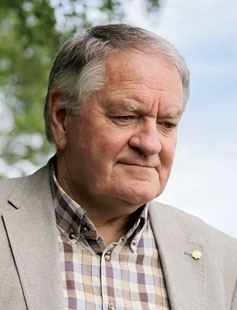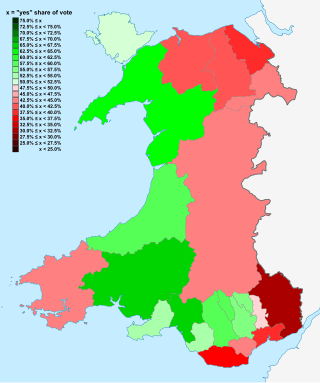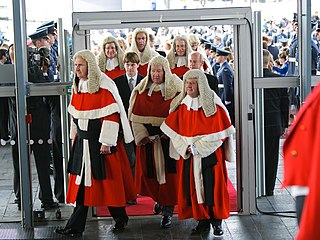The topic of this article may not meet Wikipedia's general notability guideline .(April 2024) |
This is a list of historical and current movements, campaigns and political positions in Wales.
The topic of this article may not meet Wikipedia's general notability guideline .(April 2024) |
This is a list of historical and current movements, campaigns and political positions in Wales.
Plaid Cymru is a centre-left to left-wing, Welsh nationalist political party in Wales, committed to Welsh independence from the United Kingdom. It campaigns on a platform of social democracy and civic nationalism. The party is a strong supporter of the European Union and is a member of the European Free Alliance (EFA). The party holds 4 of 32 Welsh seats in the UK Parliament, 12 of 60 seats in the Senedd, and 202 of 1,231 principal local authority councillors. Plaid was formed in 1925 under the name Plaid Genedlaethol Cymru and Gwynfor Evans won the first Westminster seat for the party at the 1966 Carmarthen by-election.

The Welsh Language Society is a direct action pressure group in Wales campaigning for the right of Welsh people to use the Welsh language in every aspect of their lives. The chair of the Welsh Language Society since October 2023 is Joseff Gnagbo.

Dafydd Iwan Jones is a Welsh singer and nationalist politician who rose to fame writing and performing folk music in the Welsh language. From 2003 to 2010, Iwan was the president of Plaid Cymru, a political party which advocates for Welsh independence from the UK.

The Welsh devolution referendum of 1997 was a pre-legislative referendum held in Wales on 18 September 1997 over whether there was support for the creation of a National Assembly for Wales, and therefore a degree of self-government. The referendum was a Labour manifesto commitment and was held in their first term after the 1997 election under the provisions of the Referendums Act 1997. This was the second referendum held in Wales over the question of devolution: the first referendum was held in 1979 and was defeated by a large majority.

Welsh nationalism emphasises and celebrates the distinctiveness of Welsh culture and Wales as a nation or country. Welsh nationalism may also include calls for further autonomy or self-determination, which includes Welsh devolution, meaning increased powers for the Senedd, or full Welsh independence.

Politics in Wales forms a distinctive polity in the wider politics of the United Kingdom, with Wales as one of the four constituent countries of the United Kingdom (UK).
Yes for Wales! is the name used to refer to two separate cross-party pro-devolution groups that were formed in the lead up to the 1997 and the 2011 devolution referendums held in Wales.

Welsh law is an autonomous part of the English law system composed of legislation made by the Senedd. Wales is part of the legal jurisdiction of England and Wales, one of the three legal jurisdictions of the United Kingdom. However, due to devolution, the law in Wales is increasingly distinct from the law in England, since the Senedd, the devolved parliament of Wales, can legislate on non-reserved matters.

Welsh independence is the political movement advocating for Wales to become a sovereign state, independent from the United Kingdom.
The Welsh Conservatives, also known as the Welsh Conservative Party, is the branch of the United Kingdom Conservative Party that operates in Wales. At Westminster elections, it is the second-most popular political party in Wales by vote share, having obtained the second-largest share of the vote at every general election since 1931. In Senedd elections, the Conservatives are currently the second-most supported party but have at times been third. As of 2024, they hold none of the 32 Welsh seats in the Parliament of the United Kingdom, and 16 of the 60 seats in the Senedd.

The modern history of Wales starts in 1800 and continues until the present day. In the 19th century, South Wales became heavily industrialised with ironworks; this, along with the spread of coal mining to the Cynon and Rhondda valleys from the 1840s, led to an increase in population. The social effects of industrialisation resulted in armed uprisings against the mainly English owners. Socialism developed in South Wales in the latter part of the century, accompanied by the increasing politicisation of religious Nonconformism. The first Labour Party MP, Keir Hardie, was elected as a junior member for the Welsh constituency of Merthyr Tydfil and Aberdare in 1900.

Unionism in Wales is the political view that supports a political union between Wales and the other countries of the United Kingdom. As well as the current state of the UK, unionism may also include support for Federalism in the United Kingdom and a United Kingdom Confederation.
The Abolish the Welsh Assembly Party, or in Wales, simply Abolish, is a registered single issue political party in Wales. It campaigns for the abolition of the Senedd, formerly known as the "National Assembly for Wales", the devolved legislature of Wales. Abolish advocates that devolved powers be returned to the Secretary of State for Wales within the UK Central Government and the Parliament of the United Kingdom at Westminster.

YesCymru is a non party-political campaign for an independent Wales. The organisation was formed in summer 2014 and officially launched on 20 February 2016 in Cardiff. In 2022 it became a private company limited by guarantee without share capital.

The Parliament for Wales Campaign was a political campaign for a Welsh parliament of elected representatives in Wales. This campaign was also known as a "Campaign for a Welsh Assembly".
Undeb Cymru Fydd was a Welsh patriotic and cultural society. It was founded in 1941 when Undeb Cenedlaethol y Cymdeithasau Cymreig and Pwyllgor Amddiffyn Diwylliant Cymru merged to form a new organization with the aim of promoting Welsh culture and the Welsh language and to be the focus and medium of cooperation for that purpose. The new organization took the name of the earlier patriotic movement Cymru Fydd, which was established in 1886.

Welsh devolution is the transfer of legislative power for self-governance to Wales by the Government of the United Kingdom.
Labour for an Independent Wales is a group of Labour Party members who "believe the best way to achieve a democratic socialist Wales is through independence".

A referendum on Welsh independence from the United Kingdom (UK) has been proposed by pro-independence supporters, including independence campaign group YesCymru, pro-independence political party Plaid Cymru and other groups and individuals. These follow similar calls for a proposed second Scottish independence referendum. Pro-independence party Plaid Cymru has pledged to hold a referendum should they win a majority of seats in the Senedd.
There have been calls for further Welsh devolution, increasing the autonomy for Wales, since the Welsh legislature of the Senedd was founded following the 1997 Welsh devolution referendum.